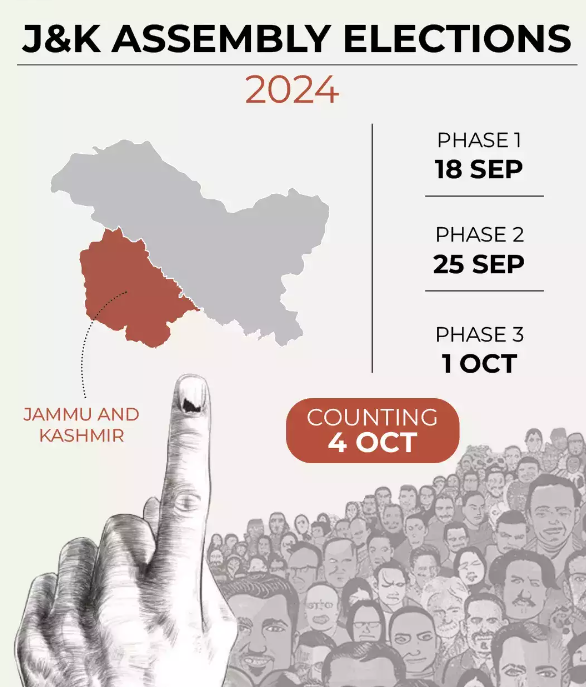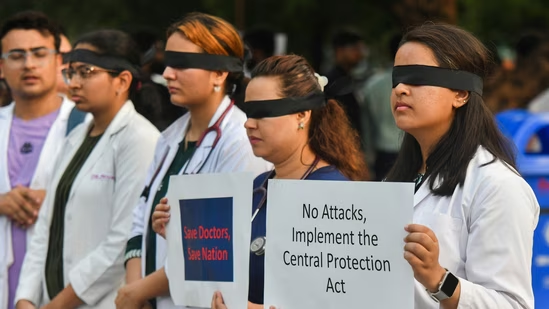Jammu-Kashmir, the region known for its picturesque landscapes and tumultuous history, is back in the political spotlight as it gears up for its first elections in a decade. With the abrogation of Article 370 five years ago, these elections carry significant weight, and the political manoeuvring is already heating up. The BJP, the National Conference (NC), and Congress are all in the mix, setting the stage for a dramatic showdown.
The Importance of Article 370
To understand the current political scenario in Jammu-Kashmir, it’s crucial to revisit the significance of Article 370. Enacted in 1949, Article 370 granted special autonomy to the state of Jammu & Kashmir, allowing it to have its own constitution, a separate flag, and autonomy over internal matters except defence, communications, and foreign affairs. This special status was a condition for its accession to India in 1947.
However, on August 5, 2019, the Indian government, led by the BJP, took the historic step of abrogating Article 370, thereby revoking Jammu-Kashmir’s special status. This move was met with mixed reactions—while it was celebrated by some as a step towards integrating the region fully into India, others viewed it as an infringement on the rights and autonomy of the people of Jammu & Kashmir.
The History of Kashmir: A Brief Overview
The Kashmir region has been a contentious issue since India and Pakistan gained independence in 1947. Both countries claim Kashmir, leading to several wars and ongoing military tensions. The region was initially ruled by a Maharaja who decided to join India in exchange for military aid and protection when tribal forces, backed by Pakistan, invaded.
Since then, Kashmir has been a flashpoint between the two nuclear-armed neighbours, with numerous skirmishes and a long-standing insurgency that has claimed thousands of lives. The abrogation of Article 370 was seen as an attempt by the Indian government to quell separatist sentiments and integrate Kashmir more closely with the rest of India.
Read more: Hijab ban debate
Fresh Elections in Jammu-Kashmir After a Decade
Fast forward to 2024, and Jammu-Kashmir is preparing for its first elections in a decade. These are not just any elections; they are the first since the state’s reorganization into a Union Territory after the revocation of Article 370. The elections are seen as a critical test of the central government’s decision to abrogate the special status and a chance to bring democratic processes back to the region.
BJP’s Internal Rift: Candidate Chaos
The Bharatiya Janata Party (BJP), which played a pivotal role in the abrogation of Article 370, is currently facing internal strife. According to reports, a rift has erupted within the party’s J&K unit over the proposed candidate list for the upcoming elections. Some BJP leaders are dissatisfied with the candidate selection process, feeling sidelined and ignored. This discontent has led to a lot of flip-flopping, with different factions within the party pushing for their preferred candidates. This internal discord comes at a critical time, potentially weakening the party’s position in a region where it hopes to consolidate its gains post-Article 370.
NC-Congress Alliance: A Strategic Move
On the other side, the National Conference (NC), led by Farooq and Omar Abdullah, has joined forces with Congress in a strategic alliance. The two parties have finalized a seat-sharing arrangement, with NC contesting 51 seats and Congress going for 32. This alliance is a calculated effort to present a united front against the BJP and to capitalize on any anti-BJP sentiment in the region.
The NC-Congress alliance has also reportedly requested that the People’s Democratic Party (PDP), another significant player in J&K politics, refrain from fielding candidates against NC, thus avoiding a split in the opposition vote and strengthening their chances against the BJP. This move highlights the level of strategic planning and political manoeuvring as each party positions itself for the best possible outcome.
These elections are not just about local governance; they are a referendum on the abrogation of Article 370 and the region’s future. The outcome will be closely watched not just in India but internationally, as it will indicate the region’s political stability and the central government’s success or failure in integrating Jammu & Kashmir.
The internal rift within the BJP and the strategic alliances formed by the NC and Congress signals a fiercely contested election. With emotions running high and the stakes even higher, the political landscape in Jammu & Kashmir is set for a dramatic transformation.
As the election dates draw nearer, it remains to be seen how these political dynamics will play out. Will the BJP manage to resolve its internal conflicts and present a unified front? Can the NC-Congress alliance mobilize enough support to challenge the BJP’s dominance? And most importantly, how will the people of Jammu & Kashmir respond after years of political upheaval and uncertainty?
One thing is clear: the upcoming elections in Jammu-Kashmir are not just about winning seats—they are about shaping the future of a region that has long been at the heart of India’s national consciousness. As the campaign trail heats up, all eyes will be on this beautiful yet troubled land, waiting to see which way the political winds will blow.
Image source: Times of India




